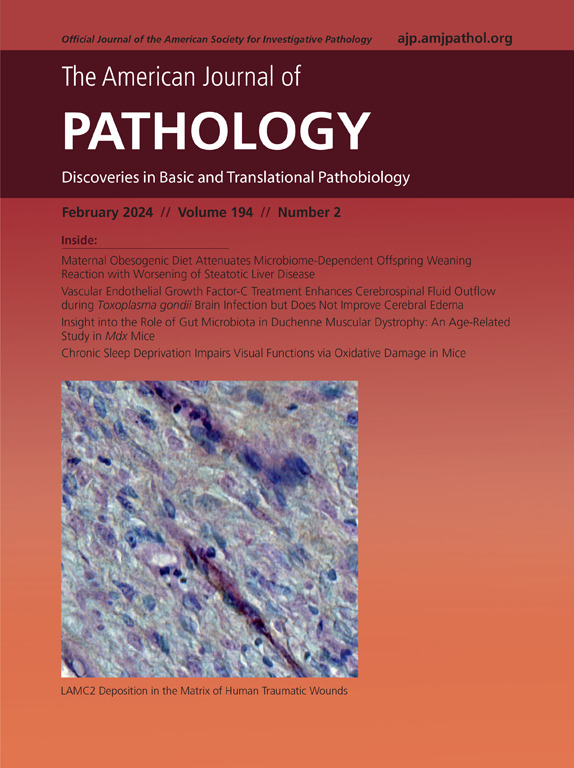The Microbial Metabolite δ-Valerobetaine Strengthens the Gut Epithelial Barrier
IF 3.6
2区 医学
Q1 PATHOLOGY
引用次数: 0
Abstract
Metabolic processes within gut microbes generate bioactive metabolites that impact intestinal epithelial barrier function. Herein, gnotobiotic mice and mass spectrometry–based metabolomics were used to identify novel metabolites in host tissues of microbial origin. Of those detected, the gut microbe–generated metabolite δ-valerobetaine (δ-VB) is a potent inhibitor of l-carnitine biosynthesis and a modulator of fatty acid oxidation by mitochondria in liver cells. The bioactivity of δ-VB toward gut epithelial barrier function was assessed. Germ-free mice are devoid of δ-VB, and administration of δ-VB to germ-free mice induced the enrichment of transcript sets associated with gut mitochondrial respiration and fatty acid oxidation in colonic tissue. Furthermore, δ-VB induced the differential expression of genes that function in barrier function in germ-free and conventionally raised mice. Functionally, δ-VB decreased gut barrier permeability and augmented wound healing in cultured gut epithelial cells and elicited cytoprotective and prorestitutive effects in a mouse model of colonic injury. These data indicate that the microbial-derived metabolite δ-VB is a modulator of gut epithelium function, and thus is a molecular target to potentially manage microbiome-host dysbiosis in intestinal health and disease.
微生物代谢物三角洲缬罗甜菜碱加强肠道上皮屏障。
肠道微生物的代谢过程产生影响肠上皮屏障功能的生物活性代谢物。利用生物小鼠和基于质谱的代谢组学,我们在宿主组织中发现了微生物来源的新代谢物。在这些检测中,我们发现肠道微生物产生的代谢物δ-缬罗甜菜碱(δ-VB)是左旋肉碱生物合成的有效抑制剂和肝细胞线粒体脂肪酸氧化的调节剂。在本研究中,我们评估了δ-VB对肠上皮屏障功能的生物活性。无菌小鼠缺乏δ-VB,我们发现给无菌小鼠δ-VB也能诱导结肠组织中与肠道线粒体呼吸和脂肪酸氧化相关的转录集的富集。此外,我们检测到δ-VB诱导无菌和常规饲养小鼠屏障功能相关基因的差异表达。在功能上,δ-VB降低了肠道屏障的通透性,增强了培养的肠道上皮细胞的伤口愈合,并在小鼠结肠损伤模型中引发了细胞保护和促恢复作用。我们得出结论,微生物衍生代谢物δ-VB是肠道上皮功能的调节剂,因此是潜在的控制肠道健康和疾病中微生物-宿主生态失调的分子靶点。
本文章由计算机程序翻译,如有差异,请以英文原文为准。
求助全文
约1分钟内获得全文
求助全文
来源期刊
CiteScore
11.40
自引率
0.00%
发文量
178
审稿时长
30 days
期刊介绍:
The American Journal of Pathology, official journal of the American Society for Investigative Pathology, published by Elsevier, Inc., seeks high-quality original research reports, reviews, and commentaries related to the molecular and cellular basis of disease. The editors will consider basic, translational, and clinical investigations that directly address mechanisms of pathogenesis or provide a foundation for future mechanistic inquiries. Examples of such foundational investigations include data mining, identification of biomarkers, molecular pathology, and discovery research. Foundational studies that incorporate deep learning and artificial intelligence are also welcome. High priority is given to studies of human disease and relevant experimental models using molecular, cellular, and organismal approaches.

 求助内容:
求助内容: 应助结果提醒方式:
应助结果提醒方式:


